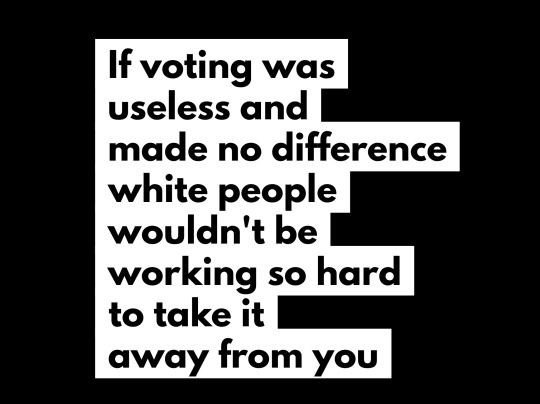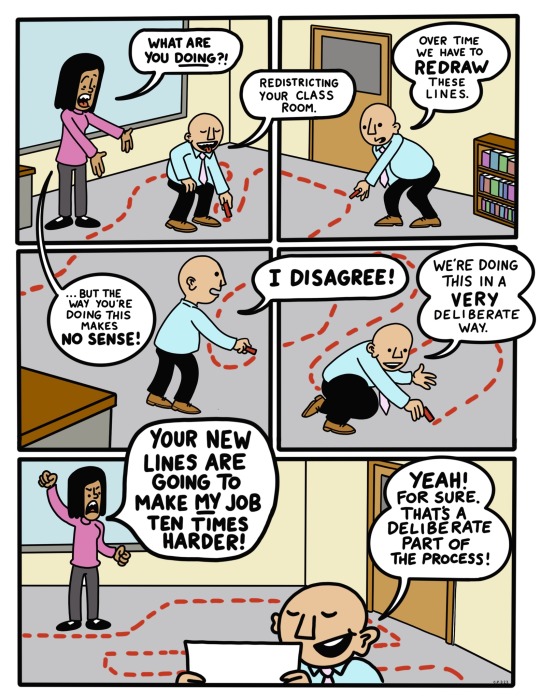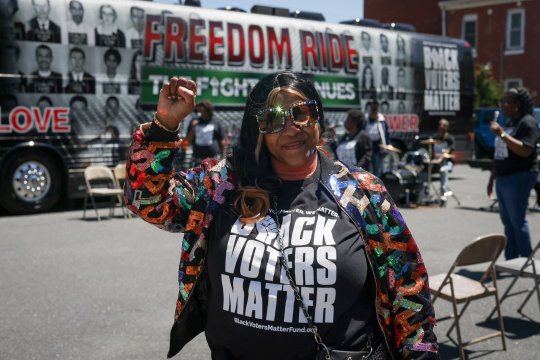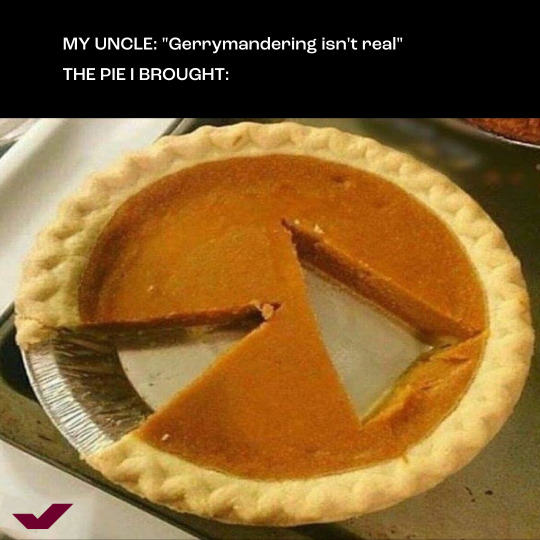#redistricting
Text

#redistricting#voting rights#political manipulation#racial discrimination#civil rights law#voting power#partisan politics#electoral fairness#voter representation#legal challenges#minority rights#judicial decisions#racism#white racial hatred#white supremacy
79 notes
·
View notes
Text

#comic panels#comic strip#speed bump#dave coverly#political cartoon#redistricting#gerrymandering#cartoon
10 notes
·
View notes
Text
Alabama Republicans, under orders of the U.S. Supreme Court to redraw congressional districts to give minority voters a greater voice in elections, rejected calls Monday to craft a second majority-Black district and proposed a map that could test what is required by the judges’ directive.
Lawmakers must adopt a new map by Friday after the high court in June affirmed a three-judge panel’s ruling that Alabama’s existing congressional map — with a single Black district out of seven statewide — likely violated the Voting Rights Act. In a state where more than one in four residents is Black, the lower court panel had ruled in 2022 that Alabama should have another majority-Black congressional district or something “close to it” so Black voters have the opportunity to “elect a representative of their choice.”
Republicans, who have been resistant to creating a certain Democratic district, proposed a map that would increase the percentage of Black voters in the 2nd congressional district from about 30% to nearly 42.5%, wagering that will satisfy the court’s directive.
House Speaker Pro Tempore Chris Pringle, who serves as co-chairman of the state redistricting committee, said the proposal complies with the order to provide a district in which Black voters have the “opportunity to elect the representative of their choice.”
“The goal here, for me, was to provide an opportunity for African-Americans to be elected to Congress in the second congressional district,” Pringle said.
However, the National Redistricting Foundation, one of the groups that backed challenges to the Alabama map, called the proposal “shameful” and said it would be challenged.
“It is clear that Alabama Republicans are not serious about doing their job and passing a compliant map, even in light of a landmark Supreme Court decision,” said Marina Jenkins, executive director of the National Redistricting Foundation.
She called that a pattern seen throughout the state’s history “where a predominately white and Republican legislature has never done the right thing on its own, but rather has had to be forced to do so by a Court.”
The Permanent Legislative Committee on Reapportionment approved the proposal in a 14-6 vote that fell along party lines. The proposal was introduced as legislation Monday afternoon as lawmakers convened a special session to adopt a new map by a Friday deadline set by the three-judge panel. House Speaker Nathaniel Ledbetter said he believes the new district will be a swing district that could elect either a Democratic candidate or a Republican.
“I think that the models will show that it could go either way, probably. I think all the court’s asked for was a fair chance. I certaintly think that map does it. I don’t think there’s any question about that,” Ledbetter said.
Democrats accused Republicans of rushing the process and thwarting the court’s directive.
Sen. Vivian Davis Figures, a Democrat from Mobile, said the court was clear that the state should create a second majority-Black district or something close to it.
“42% is not close to 50. In my opinion 48, 49 is close to 50,” Figures said. She had urged colleagues to adopt a proposal by the plaintiffs in the Supreme Court case that would make the 2nd district 50% Black.
Under the Republican plan, the state would continue to have one majority Black district, which is now represented by Rep. Terri Sewell. The Black voting age population of that district would drop from about 55% to 51.6%
Rep. Chris England, a Democrat from Tuscaloosa, said he also doesn’t think the GOP proposal would satisfy the court’s directive. He said Republican lawmakers pushed through their proposal without a public hearing or producing an analysis of the partisan leanings of the district.
“The map that we adopted, nobody had any input on. There was no public input on it, not subject to a public hearing — and now it’s going to be the map of choice,” England said.
Deuel Ross, a lawyer with the NAACP Legal Defense and Educational Fund who argued the case before the Supreme Court, said they will challenge the proposal if it is enacted by the Alabama Legislature.
“Any plan with a low Black voting age population does not appear to comply with the Court’s instruction,” Ross wrote in an email.
Partisan politics underlies the looming redistricting fight. A higher percentage of Black voters increases the chances that a the seat will switch from GOP to Democratic control.
Pollster Zac McCrary said predicting a district’s partisan leanings depends on a number of metrics, but “getting a district too far below the mid 40s in terms of Black voter composition could certainly open the door for Republicans.”
#us politics#news#the associated press#ap news#2023#alabama#us supreme court#scotus#republicans#conservatives#redistricting#gerrymandering#congressional districts#congressional maps#Voting Rights Act#Chris Pringle#Alabama Legislature#National Redistricting Foundation#Marina Jenkins#Permanent Legislative Committee on Reapportionment#Nathaniel Ledbetter#Vivian Davis Figures#Terri Sewell#Chris England#Deuel Ross#NAACP Legal Defense and Educational Fund#Zac McCrary#Allen v. Milligan
17 notes
·
View notes
Text
DeSantis Florida redistricting map is unconstitutional and must be redrawn, judge says : NPR
15 notes
·
View notes
Text
BREAKING: An 8th Circuit panel of federal judges has struck down the main path for enforcing the Voting Rights Act’s Section 2 protections for people of color, upholding a lower court ruling that says private individuals can’t bring lawsuits under the law

5 notes
·
View notes
Video
youtube
🚨 MASSIVE surprise court ruling rocks justice system
IF YOU LIVE IN ARKANSAS, MINNESOTA, IOWA, MISSOURI, NEBRASKA, NORTH DAKOTA AND SOUTH DAKOTA
Private individuals and groups, who did not represent the U.S. government, have for decades brought the majority of Section 2 cases to court. Those cases have challenged the redrawing of voting maps and other steps in the elections process with claims that the voting power of people of color has been minimized.
now only the head of the Justice Department, the U.S. attorney general, can bring Section 2 lawsuits.
#voting rights act#voting#redistricting#democracy#rights of voters#iowa#missouri#nebraska#north dakora#south dakota#trump judicial appointee
2 notes
·
View notes
Text

My latest for Ohio Schools magazine on the mess of redistricting in the Buckeye state.
141 notes
·
View notes
Text
Statement on Florida Court Ruling Overturning Racist Voter Maps

Today, a 2nd Circuit Court Judge in Florida sided with Black Voters Matter, Equal Ground Education Fund, League of Women Voters of Florida, and Florida Rising and agreed that our position, that DeSantis’ Map diminished the voting power of Black voters in violation of the Florida Constitution, would likely succeed on the merits. Today’s decision means that DeSantis’ racially gerrymandered map, which re-configured Florida’s Congressional District 5, will not be used for the 2022 election. While the State will appeal the decision, we consider this a major victory for Black Voters in Florida’s Congressional District 5, and we, along with the other co-plaintiffs will continue to fight to have DeSantis’ entire unconstitutional and racist map thrown out.
Today and going forward, Black Voters Matter remains committed to using every democratic tool to increase political power for Black people in this country. Litigation has been and remains one of those tools, but a multi-pronged threat needs a multi-pronged solution. That’s why we are continuing to mobilize our communities, pressuring Congress to pass much-needed voting rights legislation, and demanding that the President use all of his executive power to protect the rights of Black voters. And it’s why we’re urging voters to join the fight for voting rights by signing our One Million For Voting Rights petition. In southern states like Florida, where the rights of Black people are constantly under attack, the need for federal action on voting rights simply could not be clearer.
Now, we must keep the faith. We firmly believe that the cause to expand political rights in this country to all people, which will allow us to share in power and resources is a just cause, and if we faint not, we will win.
Tonight at 6:00 p.m. ET, Black Voters Matter and the co-plaintiffs in the case will hold a Twitter town hall space to discuss next steps in the Florida case. You can join on Twitter by following @BlackVotersMtr.
#blackvoters#black#voters#blackvotersmatter#itsaboutus#power#love#vote#cantstopwontstop#votingrights#florida#redistricting#fairrepresentation#representation
37 notes
·
View notes
Photo

This Thanksgiving, remember that visuals can be super helpful when discussing controversial topics.
🥧 ɢᴇʀʀʏᴍᴀɴᴅᴇʀɪɴɢ | noun | ger·ry·man·der·ing
: the practice of dividing or arranging an electoral map into election districts such that the map gives one political party an unfair advantage in elections.
9 notes
·
View notes
Text

[The Daily Don]
* * * * *
An indictment to preserve the rule of law.
June 9, 2023
ROBERT B. HUBBELL
A Miami federal grand jury issued an indictment against former president Donald Trump on June 8, 2023. According to early reporting, the indictment includes seven counts, including willful retention of national defense documents, making false statements, conspiracy, and obstruction of justice (possibly for witness tampering). Trump claims he will appear in federal court in Miami next Tuesday to enter a plea.
Indicting Trump is the right result. Indeed, it was necessary to protect the rule of law and preserve the Constitution. Trump is entitled to the presumption of innocence (in court) and a fair trial, but the publicly known facts strongly suggest that Trump is guilty. Failing to indict Trump would have undermined public trust in fairness, justice, and equality under the law in the US.
The indictment of Trump is no cause for celebration, but it is cause for relief and gratification that the organs of justice in the United States are up to the task of holding a former president to account. As Larry Tribe and Dennis Aftergut wrote in The Bulwark, “The long-anticipated charging of the former president shows a Justice Department worthy of its name.”
It was not a foregone conclusion that special counsel Jack Smith would seek an indictment or that a grand jury would issue one despite substantial evidence to support probable cause. Others before Jack Smith walked to the precipice of holding Trump to account and blinked. Smith did not. And Merrick Garland did not exercise his right to overrule Smith’s decision to seek an indictment. For that, we should be grateful.
It is sobering and disappointing to know that a former president of the United States would stoop to obstruction of justice, lies, conspiracy, and unlawful retention of defense secrets because he believed (wrongly) that he was above the law. Trump is not the first president to abuse his power or break the law, but Trump’s indictment will dissuade future presidents tempted to do so. That is the point. If we do not enforce the law when the facts demand it, the law is a mockery.
The June 8th indictment should also provide all Americans with hope that Trump will be indicted for his attempted coup and incitement of the insurrection on January 6th. Though the charges regarding retention of defense secrets are serious, those charges are subject to confusion and false equivalency because Vice President Pence and President Biden both inadvertently retained classified documents when they completed their respective terms as vice president. Although those cases are easily distinguishable, nuance is not a strong suit of viewers of Fox News (an insight that is critical to Fox’s success).
Prosecuting Trump will be an ordeal for the nation. So be it. The only thing worse for the nation than prosecuting Trump is not prosecuting Trump. Failing to prosecute Trump would be a dereliction of duty from which the nation would not recover. So, as we endure Trump's effort to turn his prosecution into a spectacle that is equal parts circus and cage match, we should be confident that the ordeal is worth the effort. America is bigger than Trump and will abide long after Trump becomes the American icon for corruption.
We will hear dozens of times over the next year that Trump is “entitled to a presumption of innocence.” That is a true statement but applies to the jury that weighs the evidence of his guilt. See Manual of Model Jury Instructions, 1.2 The Charge—Presumption of Innocence | Model Jury Instructions. But we are not jurors and are entitled to form opinions based on facts known to the public. The issuance of the indictment does not strip us of our First Amendment Rights or our ability to make reasoned judgments. The evidence strongly suggests that Donald Trump is guilty of unlawful retention of national defense documents—a felony for which others in his position have been sentenced to three years in prison.
Jack Smith’s selection of Miami as the venue for Trump's trial suggests that Smith’s objective is to obtain a conviction that will be upheld on appeal and result in a prison sentence for Trump. The details regarding the selection of Miami as a venue are complicated and not worth explication at this point. Smith has made his choice of venue, a choice that signals his intent to obtain a conviction that will stick.
An underreported detail is that five sealed cases were filed in Miami federal court within minutes of one another on Thursday. See Anna Bower on Twitter (attaching a copy of the PACER listing for Southern District of Florida). One sealed case is presumably against Trump; it is reasonable to infer that the other four sealed cases are against Trump's co-conspirators. If true, the filing of five cases by Jack Smith suggests that he is serious about prosecuting everyone who violated the law.
After I reviewed the above paragraphs with my Managing Editor/wife, she said, “That’s fine, but you haven’t told your readers how you feel about the indictment.” Since my Managing Editor’s advice is unerring, here is how I feel about the indictment:
For the last four years, I have felt frustrated, upset to the point of anger, and incredulous that Trump has managed to escape accountability despite his public, manifest corruption. Those feelings have been exacerbated by the gleeful, bad-faith defense of Trump by his GOP minions who were more interested in “owning the libs” than in “protecting the Constitution.” It was revolting. Indeed, there is a universal human revulsion to being placed in an unfair situation where everyone knows the situation is unfair but there is no remedy to the unfairness. That is how I have felt over the last four years—a feeling shared by tens of millions of Americans.
Tonight, I feel a sense of relief and vindication. I want Trump to be held accountable after a fair trial. He deserves to be convicted. He deserves to be sent to prison. Indeed, if he were anyone other than a former president, he would already be in prison (or in jail as he awaits his trial date without benefit of bail). I am disgusted that the media has already turned to the question of “What are the political implications of the indictment?” To be sure, that is a serious question worthy of discussion. But the fact that a former president has been indicted under the Espionage Act is more than a set up for speculation about 2024.
I am gratified that the tide has turned against Trump. He will be indicted in Georgia for election interference. He will stand trial in Manhattan in March 2024. And the odds are that he will be indicted for attempting a coup and inciting an insurrection. He deserves all that and more. And he will continually incriminate himself—as he did during the CNN townhall and his post on Truth Social on Thursday evening. The knowledge that every word he utters makes his conviction more certain will make the next two years more bearable.
But my overwhelming feeling on Thursday night is that the center has held—as I believed it would. My faith in the Constitution and the rule of law has been rewarded. None of this means that I will let down my guard or assume victory. But a win every once in a while, especially on important matters, can renew our faith and reinvigorate our will to win.
That’s how I feel tonight. Speaking of “securing a win every once in a while,” read on!
Supreme Court rules that Alabama racial gerrymandering violated Section 2 of Voting Rights Acts.
In a surprise to Court watchers, the US Supreme Court ruled 5-4 that racial gerrymandering by the Alabama legislature violated Section 2 of the 1965 Voting Rights Act. John Roberts and Brett Kavanaugh joined the Court’s three liberal justices to preserve the last remaining section of the Act that was gutted by John Roberts in Shelby County v. Holder.
For a detailed discussion of the holding, see Mark Joseph Stern in Slate, John Roberts and Brett Kavanaugh saved the Voting Rights Act. Per Stern,
The Supreme Court’s 5–4 decision in Allen v. Milligan on Thursday, which found that Alabama’s congressional map violates the Voting Rights Act’s ban on racial vote dilution, sends two clear messages. First, a bare majority of the court—Chief Justice John Roberts, Justice Brett Kavanaugh, and the three liberals—believes that the VRA still plays a meaningful role in maintaining a multiracial democracy (or is willing to defer to Congress’ judgment on the matter). Second, that same majority of the court does not look kindly upon red states’ race to shred decades of precedent in an effort to wipe out the voting power of Black Americans.
The good news is that the decision means that Alabama must create a second congressional district in which the voting power of Black voters is not diluted by gerrymandering. It is likely that Alabama will add a second Black Democratic representative to its congressional delegation.
The even better news is that the holding in Allen v. Milligan will likely boost the prospects for plaintiffs in cases across the nation challenging racial gerrymandering by GOP legislatures. See Democracy Docket, How the U.S. Supreme Court’s Decision in Allen v. Milligan Will Impact Ongoing Redistricting Litigation. It is possible the effect of the ruling in Allen v. Milligan is a net gain of six Democratic seats in the House in 2024.
Why did John Roberts and Brett Kavanaugh switch sides to join with the liberal justices? One theory (with which I agree), is that Roberts and Kavanaugh understand that their ruling in Dobbs has inflicted a grievous wound on the Court’s legitimacy and they are attempting to limit the damage. Whatever the reason, the ruling is a major victory for advocates for voting rights. As I said above, a win every once in a while, especially on important matters, can renew our faith and reinvigorate our will to win. We should all feel good tonight!
#The Daily Don#J.Ouquette#TFG#Robert B. Hubbell#Robert B. Hubbell Newsletter#GOP Legislatures#Allen v. Milligan#redistricting
5 notes
·
View notes
Text
What if the GA Congressional Map was like this?
2 notes
·
View notes
Text
Wisconsin voters on Tuesday will cast their primary ballots in what's turned into an expensive and high-stakes battle for control of the state Supreme Court in a key political battleground where power is divided between a Democratic Governor and a Republican-controlled legislature.
Voters will narrow the field of candidates down to two, who will then advance to April's general election for a seat on a court where conservatives currently hold a 4-3 majority. Although the election is technically nonpartisan -- there are no party labels on the ballot -- interest groups align, party operations mobilize and money flows into races for its seats as if they were partisan contests.
The departure of a conservative justice, Patience Roggensack, has given liberals an opportunity to seize the majority on a court that could decide on issues such as abortion, redistricting, and voting rights ahead of the 2024 presidential election.
Conservatives have controlled the state's high court for 14 years -- a span in which the court has sided with Republicans' union-busting efforts and affirmed voting restrictions, including ID requirements and a ban on ballot drop boxes.
"This seat is crucial to the balance of the court, and the court is crucial to the balance of the state," said Barry Burden, a political scientist at the University of Wisconsin-Madison and director of its Elections Research Center.
The candidates hoping to advance to the April general election are liberals Janet Protasiewicz, a Milwaukee County circuit court judge, and Everett Mitchell, a circuit judge in Dane County; and conservatives Daniel Kelly, a former state Supreme Court justice, and Jennifer Dorow, a judge perhaps best known for presiding over the trial of a man convicted of killing six and injuring scores more in a 2021 attack on a Christmas parade in Waukesha, Wisconsin.
Outside money has flooded the race, surpassing candidate spending. As of Thursday afternoon, orders for TV and radio ads focused on the race had hit $7 million, according to advertising tracked by Kantar Media/CMAG for the Brennan Center for Justice at New York University's law school. Experts say the spending on the race could smash the previous record -- $15.2 million spent on a 2004 Illinois Supreme Court race, according to the liberal-leaning Brennan Center -- for the most expensive campaign for a single state Supreme Court seat.
The court could become the final arbiter on a host of critical issues in Wisconsin in the coming years -- including the fate of the state's 1849 law prohibiting abortion in nearly all cases. The US Supreme Court's decision last summer ending federal legal protections for the procedure has super-charged the rhetoric -- and spending -- around abortion in the Wisconsin race.
The state Supreme Court could also play a crucial role in the 2024 election. Wisconsin was a key location of former President Donald Trump's attempts to overturn his 2020 loss, and the refusal of a conservative justice on the state Supreme Court to go along with an effort that year to toss out ballots in two heavily Democratic counties looms large in the rivalry between the two right-leaning candidates in this year's race.
#us politics#news#cnn#cnn politics#2023#Wisconsin#Wisconsin supreme Court#election#2023 election#Patience Roggensack#abortions#redistricting#voting rights#voter id laws#ballot drop boxes#Janet Protasiewicz#Everett Mitchell#Daniel Kelly#Jennifer Dorow#Brennan Center for Justice#Kantar Media#cmag
14 notes
·
View notes
Text
Wisconsin’s extreme gerrymandering era ends as new maps come into force | Wisconsin | The Guardian
3 notes
·
View notes
Quote
Piedmont has been the way it is now for 105 years: a wealthy, family-oriented community surrounded by Oakland. It's believed to be the only city in the United States to be located completely within another city.
Carolyn Jones, Oakland
#Public Schools#school choice#elite#redistricting#carolyn jones#jones#oakland#Piedmont borders at issue#oakland piedmont borders at issue#2012#jones 2012#11/22/2012
1 note
·
View note